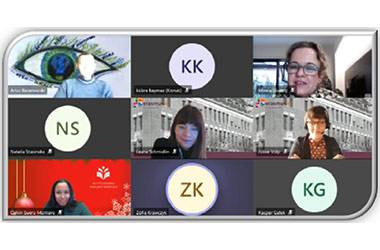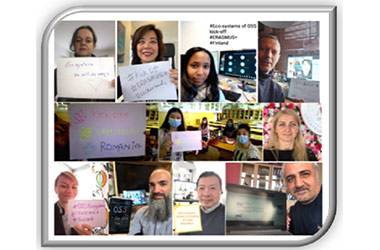Wittenborg Online News!
Erasmus+ 'Eco-Systems of Open Science Schooling' Project is Officially Open
Erasmus+ 'Eco-Systems of Open Science Schooling' Project is Officially Open
Erasmus+ 'Eco-Systems of Open Science Schooling' Project is Officially Open
2-year Erasmus+ Project Receives Grant from EU
 Wittenborg University of Applied Sciences has been awarded the task by the European Commission to head and coordinate research on 'Eco-Systems of Open Science
Schooling'. The 2-year Erasmus+ project, which received an EU grant of more than EUR 250,000, started in October 2020 and is expected to be completed by September 2022.
Wittenborg University of Applied Sciences has been awarded the task by the European Commission to head and coordinate research on 'Eco-Systems of Open Science
Schooling'. The 2-year Erasmus+ project, which received an EU grant of more than EUR 250,000, started in October 2020 and is expected to be completed by September 2022.
The main aim of the project is to encourage “open schooling” where schools, in cooperation with other stakeholders, become an agent of community well-being. According to Commission 2015, Science Education for Responsible Citizenship, families are encouraged to become real partners in school life and activities, while professionals from enterprises, civil and wider society should be actively involved in bringing real-life projects into the classrooms. To make open science schooling a reality, the Commission recommends schools have "permanent and sustainable access to real-life and real-time science resources (locally and globally) for students and teachers to tap into". This works if the agents in the eco-systems make available the basic resources, infrastructures and collaboration to schools and students to help them conduct and accomplish science missions.

A more open, exciting and stimulating way of learning science
The project concept is built on the invaluable lessons learned from the 30-month Open Science Schooling Erasmus+ Schools project, which was coordinated by the University of Eastern Finland. It has been proven that Open Science Schooling is robust and more appealing compared to traditional science teaching, and it offers students a much more open, exciting and stimulating way of learning science.
Led by its CEO, Maggie Feng, and supported by Professor Dadi Chen and Hanna Abdelwahab, Wittenborg will liaise with 50 secondary school students working through a total of 20 science missions in eight participating countries. The partners involved in this project are Itä-Suomen Yliopisto (University of Eastern Finland), Liceum Ogólnokształcące z Oddziałami Dwujęzycznymi im. Adama Mickiewicza (Poland), Pasvalio Levens Pagrindine Mokykla (Lithuania), Scoala Gimnaziala Gheorghe Titeica (Romania), Eelazig Doga Anadolu Lisesi (Elazig Egitimcilik Tic.ve San. A.S) (Turkey), and Working with Europe/Treballant amb Europa Associació (Spain).

Students enthusiastic to collaborate with peers from partner schools
The two-day virtual kick-off meeting was held on 17th and 18th December, 2020. During the first day, Feng, together with Calkin Suero Montero, a knowledge expert from the University of Eastern Finland, and Mireia Masgrau, a grant application specialist based in Spain, extended a warm welcome to the respective partner schools’ coordinators, school managers, science teachers and students who were present. Masgrau impressed on the participants that there is a need to shift the mindset of teachers, schools and society, to change the way science is being taught to youngsters of this new generation in order to keep their interest, curiosity and engagement alive.
Montero, when commenting on the brainstorming sessions for a suitable logo for the project, emphasised that science learning should not be a closed box, but instead should involve collaboration and cooperation with external partners, organisations and every agent in the eco-systems. Excitement could be felt in the air during the kick-off sessions and the students who were present expressed their interest and enthusiasm to start their project and to collaborate with their peers from the other countries.
WUP 7/1/2020
By Hanna Abdelwahab
©
WUAS Press
564 words